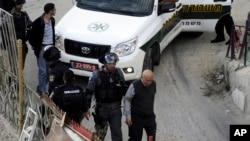Israeli police shot and killed a Palestinian man who allegedly ambushed a right-wing Israeli activist known for pushing for greater access for Jews at a flashpoint religious site in Jerusalem.
Police say the suspected gunman shot and seriously wounded American-born Rabbi Yehuda Glick.
The rabbi was attacked after leaving a conference promoting Jewish prayers on the Temple Mount, the site Muslims revere as the Mosque of Al Aqsa.
The site, which is the holiest place in Judaism and third holiest in Islam, is a flashpoint of the Israeli-Palestinian conflict.
Israeli security officials temporarily shut down the area, but reopened it after Palestinian President Mahmoud Abbas condemned it as a "declaration of war."
U.S. Secretary of State John Kerry says Israel must reopen the Temple Mount to Muslim worshippers, saying he is extremely concerned over growing tensions in Jerusalem.
Kerry said late Thursday it is absolutely critical all sides exercise restraint, avoid provocative actions and rhetoric and preserve the historic status quo of the Temple Mount - the Jerusalem holy site Muslims call the al-Aqsa mosque and revered by Jews and Muslims.
Suspect quickly found
Police anti-terror units tracked the assailant to his home in a mixed Jewish-Arab neighborhood of Jerusalem, where he was killed in a shootout.
Police commissioner Yochanan Danino praised the quick work of the security forces, saying it is a warning to all terrorists that Israel will track them down wherever they are.
The police raid sparked angry protests by Palestinians, who shouted slogans and threw stones.
The dead Palestinian was identified as Moatez Hejazi, an Islamic militant recently released from prison. His neighbors accused Israel of carrying out an execution.
One man told Israel Radio that Hejazi was not an extremist, but that Hejazi was driven to violence because of Israel’s persecution of Palestinians and Muslims.
The shootings are further stoking Jewish-Muslim tensions in Jerusalem, which have been escalating since the Gaza war in the summer.
Daily clashes between police and Palestinian youths in Arab neighborhoods of the city are raising fears of a third Palestinian uprising.
Sweden recognizes Palestinian State
The Swedish government officially recognized the Palestinian State Thursday, a day of more violence in Jerusalem and criticism of Israel by the the U.N. Human Rights Committee.
Swedish Foreign Minister Margot Wallstrom said she hoped her country's recognition would help revive the stalled Israeli-Palestinian peace process and that other EU nations would follow suit.
"There is a territory, a people and a government. Not to recognize Palestine because of the occupation would be against the principle of international law about no fruits of aggression. Remember that more than 130 countries already recognize Palestine and we will be in fact number 135," said Wallstrom.
The decision drew praise from the Palestinian president and criticism from Israel, which recalled its ambassador from Stockholm for consultations.
U.S. State Department Spokeswoman Jen Psaki says the U.S. supports Palestinian statehood but it can only come through direct negotiations between Israel and the Palestinians that resolve final status issues and end the conflict.
Palestinians seek statehood in the Israeli-occupied West Bank and the blockaded Gaza Strip, with East Jerusalem as their capital.
But years of efforts to forge a two-state solution with the Israelis have made next to no progress and the Palestinians now see little choice but to make a unilateral push for statehood.
Some material for this report came from Reuters.






